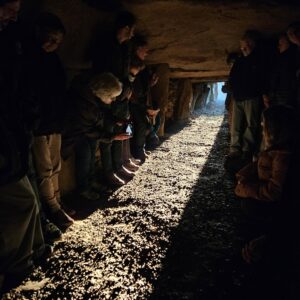
Jersey Dairy managing director Eamon Fenlon believes Jersey’s dairy products will retain and expand their niche in the market. He talked to Alasdair Crosby

Jersey Dairy has just one or two little problems – in common with the rest of the global dairy industry (and in common with everybody else). Brexit and Covid have been responsible for some of them; then there is the war in Ukraine, climate change….
‘I’ve been in manufacturing for over 30 years and I’ve never seen anything like this,’ said Jersey Dairy’s managing director, Eamon Fenlon. ‘Brexit has increased lead times on ordering anything, be it ingredients or packaging. Prices have gone through the roof; deliveries that would have taken in under four weeks are now taking three or four months.
‘It’s horrendous out there, trying to keep on top of it all. As a result of all these delays we have had to build higher stock levels of packaging and ingredients just to be on the safe side.’
In the UK, farm gate prices have gone up by 20p a litre but that has all been wiped out by farm costs, meaning there is no real benefit to the farmer.
‘Everybody thinks that prices have gone up, but costs have gone up equally. I think we’re in a situation where those prices are not going to return to where they were before.
‘In addition, there is a world shortage of dairy produce. Countries around the world are signing up to environmental commitments that have the effect of limiting production, whether it be New Zealand, for example, or northern Europe. Holland is under a court order to reduce the number of herds and that has caused angry protests in the streets. Discussions are going on in Ireland at the moment about reducing the size of the herds – that’s only going to make the supply and demand problem even more acute.
‘So least in Jersey, even if we’re not going to solve the world’s problems, we do have something that’s unique – and we’ll find our way in the market.’
And another thing! From 2008, Jersey butter portions used to be packed in the Republic of Ireland and the price was never increased. Then Brexit came along, and it became impossible to get our butter across that EU boarder . So the packing was moved to the UK, and the price doubled.
Luckily, to compensate for difficulties with exporting to the EU, a 200-strong chain of convenience stores in Hong Kong has proved to be a regular and steady customer. For eight years it has taken 1 million litres a year, mostly of whole milk, which they consider to be the best milk for coffee. They also buy Jersey butter.
The UK remains Jersey’s biggest export market, primarily for what Eamon refers to as long-life recipe-based products, of which soft-mix ice-cream is the biggest element. The ‘Jersey Gold’ brand is up about 85% on last year’s sales, although that doesn’t mean any increase in profitability – production costs have gone up as well, meaning no real benefit to the farmer.
Eamon continued: ‘There is a huge development in soft-mix ice-cream, primarily because of the development of new machinery, no bigger than a coffee machine, that enables small catering outlets to offer soft ice-cream-based desserts. A whole new sector has opened for soft-mix ice-cream and Jersey Dairy is taking every advantage of that. We are really confident of continued growth in this sector.’
Conversely, the market for liquid milk in the Island has been affected by the fewer number of tourists and the decline in the population, reckoned to be in the region of 3,000 to 4,000 in recent years. The average consumption of milk in the Island is, on average, 80 litres per head per annum, so the exodus from Jersey accounts for quite a volume of lost milk sales. That is a general trend across Europe and the USA, not, he explained, because the population at large was turning vegan, it was simply a change in consumer behaviour.
Eamon said: ‘It’s just like the change from eating potatoes to eating rice and pasta. The same thing is happening in the milk category. Just go into a supermarket, 15 years ago you just had “milk”. Nowadays you have everything under the sun in there. Ours is still very good value when you compare the price, though – and much more nutritious!
The dairy’s intake of milk from the farms is about 14 million litres per year; just over 8 million litres is consumed in the Island as liquid milk. Other products consumed in the Island amounts to 2 million litres; the rest is exported.
Considering how many lovely cheeses made from Jersey milk there are around the world, why has there never been a ‘gourmet’ or soft cheese been made in Jersey by the Dairy?
He replied: ‘We do not have a cheese manufacturing facility at the Dairy. When we produced the cheddar-type hard cheese, which we called, in Jersey-French, Le Fronmage, the milk would be taken by tanker to Dorset and the cheese then made for us at Ashley Chase Estate. We had to stop that this year because we had numerous issues with it, plus they increased their price for making and packing it significantly. There was no way we could make it at the Dairy, because of the cost of the equipment, especially as we were only making it four times a year and the sales volume was comparatively slim.’
But would not there be a market for a niche product that was created by one of the few remaining dairy herd owners, who actually wanted to create a delicious soft cheese from Jersey milk, for example? There are successful examples in both Britain and France.
‘We are a small market, so a niche market in Jersey is very niche. That is the biggest issue, doing bespoke products like that. We are often asked: “Why can’t we do this? Or that?” But our answer is: “How much volume would we get out of it? Unless we were going to export it – but then that is a different scenario. Imagine trying to export a soft cheese! Or, indeed, imagine trying to export any short shelf-life product from Jersey, particularly a dairy product. It would be very difficult.’
On a different subject, the world seems awash with anti-dairy vegan propaganda. Has that affected sales?
‘It has not affected sales too badly! There is a bit of criticism, but it all seems to be orchestrated. The support we get from the Island community is huge – and we do very well as far as brand recognition is concerned. People in Jersey are very proud of the Jersey cow – and everything that we make from her milk They realise that Jersey without the Jersey cow would be a different and far less appealing place.’
What about the packaging – how environmentally friendly is it?
‘It is not biodegradable, but it is environmentally friendly. It is made with renewable materials, and these are Carbon Trust certified – the paper coming from Forest Stewardship Council certified forests and other controlled woods, and the inner layers made from sugarcane, instead of fossil material.
Jersey looked at the feasibility of collecting cartons and reused cartons and taking them off the Island for recycling; there is a plant in Halifax that is financed by all the manufacturers of cartons. However, when we investigated, we found out that a huge amount of energy is used in a recycling plant and actually a high percentage of what goes through it ends up in an energy from waste plant – and we have our own energy from waste plant in Jersey! The carton industry is still trying to develop a carton that is fully recyclable – they haven’t succeeded yet.’
How about using glass bottles?
‘That also takes a lot of energy and the price of glass has gone through the roof recently because of that. Glass bottles have on average a life-cycle of being used 20 times and then they have to be scrapped and new ones have to be made. So there is a lot of wastage. If we went back to returnable bottles, this whole factory would have to be re-fitted. The flat-pack carton suits the Island really very well – and we don’t need to put a plastic cap on the top!’
An existential worry for the dairy – and not just for the dairy, of course – is supposing one of the Island’s current 13 dairy farmers decide to give up, specifically, if one of the six herds that supply 80% of the dairy’s intake decides to do so: that would have a catastrophic effect on milk supplies and the dairy industry and reopen the controversy of allowing the importation of cheaper milk from elsewhere.
He answered: ‘We are working on plans to mitigate that risk; it is still work in progress.’
It would be lovely to know what these plans were.
However, a new development about which he could speak, was that they have made a plant-based product for a third-party’s soft-mix ice cream. The trials have been very successful and their customer sees big opportunities for it.
Eamon said: ‘That gives the Dairy more opportunity to push more volume through, which will hopefully mean more money for the farmers. We are not just about producing milk from farms, we must utilise our facilities to the maximum and make ourselves as profitable as possible, so the dividend goes back to the farmer and helps them.
‘That is fundamentally what the Jersey Dairy is all about.’






One Response
Hi, could Jersey Milk consider a 1L
Skimmed carton please…can only find 0.5L ….and that’s not always available. Thank you.